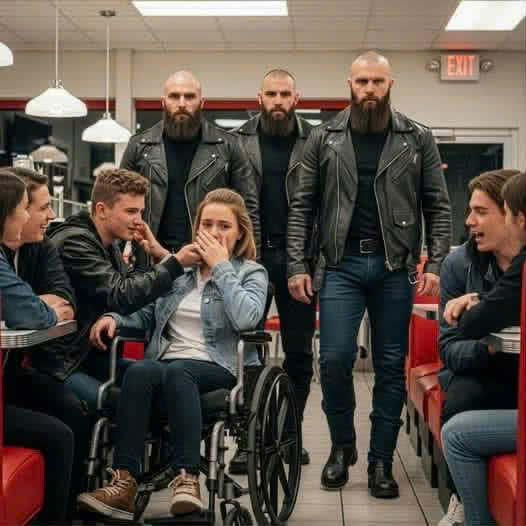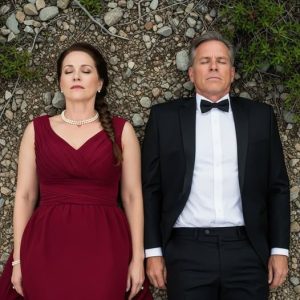Bullies Slapped a Disabled Girl in a Diner — An Hour Later, Bikers Walked In…
“Sometimes cruelty is loud, and kindness is silent—until someone dares to speak.”
It was a bright Saturday morning at Maplewood Diner, a cozy place known for its pancakes and endless coffee refills. Among the regulars sat Clara Bennett, a 14-year-old girl in a wheelchair. She had come with her backpack and a notebook, eager to enjoy her favorite blueberry pancakes while sketching quietly by the window.
At first, the morning was peaceful. The smell of coffee filled the air, waitresses moved between tables, and the jukebox played softly. But everything shifted when a group of four teenage boys swaggered in. They spotted Clara almost immediately.
“Look at her,” one of them sneered. “Bet she needs someone to cut her food.”
The others laughed. One approached her table, snatched her fork, and dropped it on the floor. Clara’s cheeks flushed, her hands trembling.
“Stop it,” she whispered.
Instead, they pushed harder. Another boy slapped her half-eaten pancake onto the ground, smearing syrup across the floor tiles. The leader leaned down, smirking cruelly. “What are you gonna do? Roll over us?
”
Laughter erupted, sharp and merciless. Some customers stared but quickly looked away. A few muttered disapproval under their breath, but no one stood up.
An older man sitting near the counter finally rose. Quietly, he picked up the plate from the ground and set it back on Clara’s table. He didn’t confront the bullies—he simply looked at Clara with gentle eyes and said, “You didn’t deserve that.” Then he returned to his seat.
But the damage was done. Clara’s eyes brimmed with tears. The diner felt colder, smaller, and every bite she had once enjoyed now tasted of shame.
No one could have guessed that within an hour, everything would change.
Clara had barely touched the replacement pancake the waitress brought when a new sound thundered through Maplewood Diner: the roar of motorcycle engines. It grew louder and louder until it shook the windows. Heads turned. The bullies, still lounging at their booth, stiffened…

…A dozen motorcycles rolled into the parking lot, chrome gleaming in the sun. The engines idled for a moment, then cut off one by one.
Through the diner’s glass doors came a group of leather-clad bikers—men and women, tall, broad, tattoos peeking from under their jackets. The patch on their backs read “Iron Wind Brotherhood.”
The leader, a rugged man with silver in his beard, removed his helmet and surveyed the room. His gaze landed on Clara. He gave a small nod, then turned to the waitress.
“Morning, ma’am. You got room for a dozen hungry riders?”
The waitress, wide-eyed, managed a nervous laugh. “Y-yes, of course. Take any tables you like.”
As they started to sit, the leader’s eyes caught the group of boys. They were whispering now, uncomfortable under the sudden weight of the bikers’ presence.
Clara tried to make herself small in her chair, hoping no one noticed her anymore. But one of the women bikers—a tall brunette with kind eyes—walked straight toward her.
“Hey, sweetheart,” she said softly, crouching down beside her wheelchair. “You okay?”
Clara hesitated. “I’m fine,” she murmured.
The woman tilted her head. “You sure? Someone mess with you?”
Before Clara could answer, the old man at the counter spoke up, voice calm but firm. “Those boys over there thought it’d be funny to pick on her.”
The diner fell silent again. Forks stopped midair. The boys froze.
The leader of the bikers turned slowly toward them. His expression didn’t change—he didn’t shout, didn’t threaten. He just looked at them. And somehow, that was worse than any yelling could’ve been.
He walked over, pulled up a chair, and sat down at their booth. “You boys local?” he asked evenly.
One of them muttered, “Yeah.”
“You like coming here?”
“Uh… yeah.”
He nodded slowly. “Then let’s keep it that way. See, we got a friend now—” he glanced over at Clara, who was watching in shock— “and anyone messes with her, they mess with all of us. Understand?”
The leader’s calm voice carried more weight than a fist ever could. The boys mumbled apologies, tripping over each other to leave cash on the table before slipping out the door.
When they were gone, the bikers went back to being their loud, laughing selves—ordering stacks of pancakes, joking with the waitresses. But Clara wasn’t invisible anymore.
One of the bikers wheeled her table closer to theirs. “Come on, kid,” the woman said warmly. “Eat with us. You got family here now.”
Clara smiled through tears she couldn’t hold back. For the first time in a long time, she felt safe.
And that morning, Maplewood Diner learned something unforgettable:
Sometimes, justice doesn’t wear a badge or a suit.
Sometimes, it rides on two wheels and wears a leather jacket.





